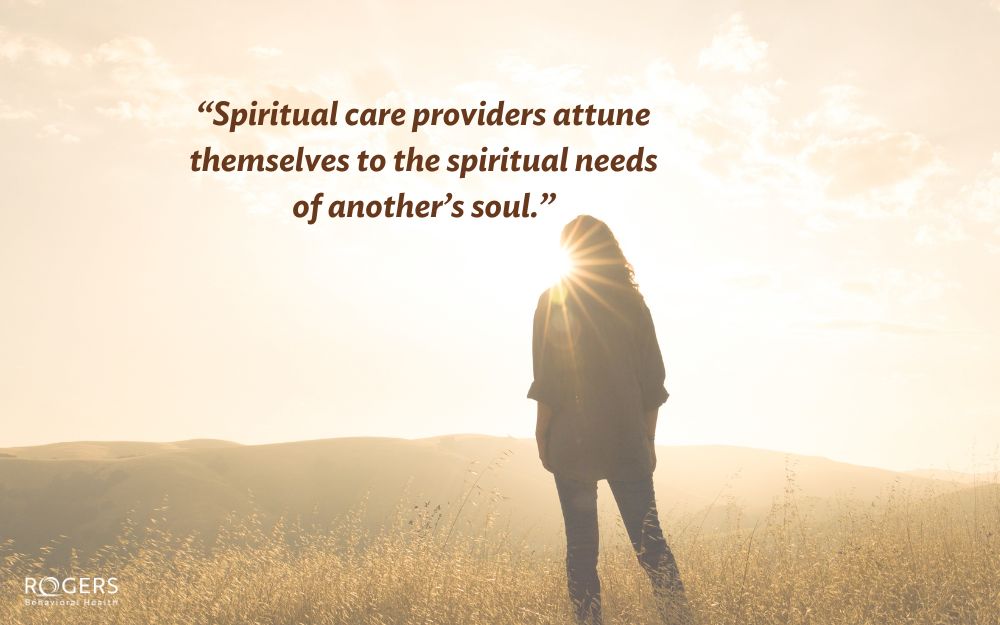Calling it, “our soul song,” Rogers Behavioral Health’s chaplain, Jeromy J. Wells explained spirituality and provided simple ways to practice it in part one of our series on the connection between spiritual and mental health.
Chaplain Jeromy wraps up the series by exploring the role of a spiritual care provider and how people receiving mental health treatment can benefit from spiritual care.
What does a spiritual care provider do?
Spiritual care providers attune themselves to the spiritual needs of another’s soul by:
- Honoring another’s autonomy by respecting their right to choose their next step.
- Honoring anger as a human emotion and exploring healthy and unhealthy expressions of anger.
- Empowering patients to define spirituality for themselves.
- Helping patients identify where their religion or spirituality has helped and/or hindered their healing process.
- Exploring what comes to mind when one thinks of the divine or sacred.
- Integrating evidenced-based practices with one’s spiritual values.
- Holding safe and sacred space for the expression of grief.
- Guarding sacred space to honor one’s experience of the divine.
- Exploring resources of hope and healing.
- Exploring religious and spiritual language used in meaning making, or how we interpret events in our lives.
- Facilitating mindfulness or meditation practices.
- Reading sacred texts, poems, or music lyrics.
- Walking in nature.
- Reviewing unhealthy beliefs about oneself and brainstorming alternative perspectives.
- Honoring another’s spiritual struggle as a significant pivot-point in their life.
- Clarifying spiritual values as key markers for one’s internal moral or spiritual compass.
- Considering spiritual strength as a way of being flexible, healthy, and good.
The list highlights some of the ways chaplains journey alongside others through those times when they feel lost, like they no longer have a purpose or belong, are a burden to others, or find themselves in a pit of despair and hopelessness. Spiritual care providers serve as spiritual companions at key points along life’s journey. They help others see their own divine spark within those long dark nights of the soul. They remind people that they matter, they’re not alone, and that each breath taken is another sign of hope.
5 ways Rogers’ Spiritual Care team works with people receiving treatment
Spiritual care services are provided only upon patient request and are free of charge for people receiving inpatient and residential treatment in Oconomowoc, West Allis, and Brown Deer, Wisconsin.
Rogers’ Spiritual Care Team intentionally cares for people receiving treatment through compassionate presence, soulful listening, and genuine respect.
Five ways we practice spiritual care are:
- Spirituality-focused discussion groups on topics like values, self-compassion, spiritual struggles, and boundaries. These groups honor every patient’s religious preference and/or spiritual beliefs.
- Individual consults.
- Facilitating clergy visits upon patient request and availability of requested clergy, like rabbi, mam, priest, shaman, etc.
- Providing religious and spiritual resources.
- Officiating or hosting holiday services.
We seek justice through equitable care for all. For me, that means that we make spiritual and religious support available for all regardless of their socioeconomic status, life choices, or their religious and spiritual affiliations. This includes, but is not limited to, providing faith-based resources for those who are seeking trauma-informed spiritual care, the marginalized and oppressed communities, and those wanting spiritual rather than religious support.
The spiritual care department provides additional continuing education opportunities on topics, such as labyrinth walking, religious scrupulosity, the integration of Acceptance and Commitment Therapy (ACT) with spiritual practices, and nursing services orientation.
The spiritual care department is made possible by generous donations to Rogers’ Foundation.
What are the benefits of spiritual care for people receiving treatment at Rogers?
People receiving care at Rogers tell me they need to talk about their spiritual struggles with someone who can hear them without judgement. When that happens, they feel:
- Respected and heard
- More hopeful
- Open to change
- Proactive in their treatment plans
I notice honesty, vulnerability, confidence, courage, an openness to learn, and a glimmer of hopefulness in those requesting spiritual care consults.
Rogers provides compassionate mental health and addiction care
If you or a loved one is struggling with mental health or addiction, we’re here to help. To get started, call 800-767-4411 for a free, confidential screening.
By Jeromy J. Wells, DMin, BCC, RYT, USAF ret., chaplain, Rogers Behavioral Health


